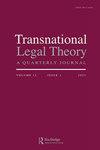Western hosts and Southern ghosts: the west-as-host construct in refugee law scholarship and its gendered implications for women in polygynous relationships
Q2 Social Sciences
引用次数: 0
Abstract
ABSTRACT Refugee law scholarship is largely focused on the application of refugee law and the refugee status determination processes of Western host countries. This geographical focus in much scholarly work stands in stark contrast to the global distribution of refugees, the majority of whom are hosted by countries of the Global South. Women refugees are particularly underrepresented in Western host states. This paper focuses attention on refugee women in polygynous relationships within the South African asylum system, exposing both the exclusionary impact of Western anti-polygamy measures and the imbalanced knowledge production in refugee law. This work makes clear the way in which an unacknowledged bias in the study of refugee law as applied only in select Western countries, limits and indeed distorts our understanding of international refugee law and serves to erase certain refugees.西方东道主与南方幽灵:西方作为东道主在难民法学中的建构及其对一夫多妻关系中女性的性别意义
摘要难民法学术主要关注西方收容国难民法的适用和难民地位的确定过程。许多学术著作中对地理的关注与难民的全球分布形成了鲜明对比,其中大多数由全球南方国家收容。女性难民在西方收容国的代表性尤其不足。本文关注的是南非庇护制度中处于一夫多妻关系中的难民妇女,揭示了西方反一夫多妻措施的排斥影响和难民法中知识生产的不平衡。这项工作清楚地表明,在研究仅适用于选定西方国家的难民法时,一种未被承认的偏见限制并扭曲了我们对国际难民法的理解,并有助于消除某些难民。
本文章由计算机程序翻译,如有差异,请以英文原文为准。
求助全文
约1分钟内获得全文
求助全文
来源期刊

Transnational Legal Theory
Social Sciences-Law
CiteScore
2.10
自引率
0.00%
发文量
7
期刊介绍:
The objective of Transnational Legal Theory is to publish high-quality theoretical scholarship that addresses transnational dimensions of law and legal dimensions of transnational fields and activity. Central to Transnational Legal Theory''s mandate is publication of work that explores whether and how transnational contexts, forces and ideations affect debates within existing traditions or schools of legal thought. Similarly, the journal aspires to encourage scholars debating general theories about law to consider the relevance of transnational contexts and dimensions for their work. With respect to particular jurisprudence, the journal welcomes not only submissions that involve theoretical explorations of fields commonly constructed as transnational in nature (such as commercial law, maritime law, or cyberlaw) but also explorations of transnational aspects of fields less commonly understood in this way (for example, criminal law, family law, company law, tort law, evidence law, and so on). Submissions of work exploring process-oriented approaches to law as transnational (from transjurisdictional litigation to delocalized arbitration to multi-level governance) are also encouraged. Equally central to Transnational Legal Theory''s mandate is theoretical work that explores fresh (or revived) understandings of international law and comparative law ''beyond the state'' (and the interstate). The journal has a special interest in submissions that explore the interfaces, intersections, and mutual embeddedness of public international law, private international law, and comparative law, notably in terms of whether such inter-relationships are reshaping these sub-disciplines in directions that are, in important respects, transnational in nature.
 求助内容:
求助内容: 应助结果提醒方式:
应助结果提醒方式:


